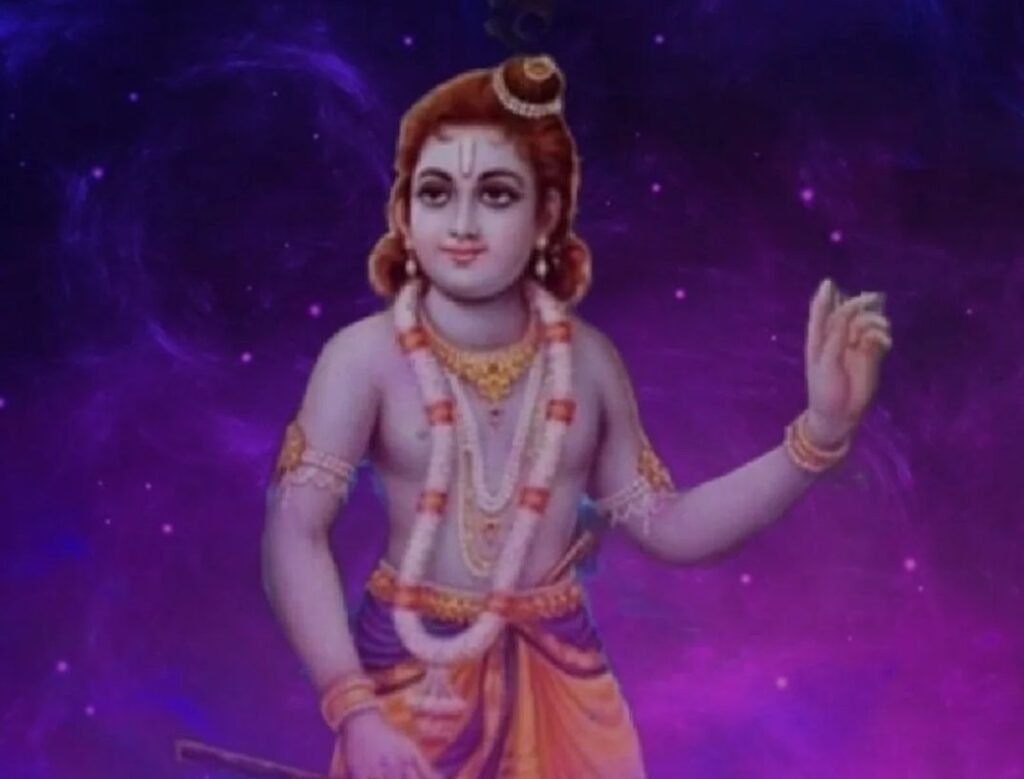Bhagwat Geeta Chapter 2 Shlok-56
The Supreme Lord conveyed: “O Parth, when an individual relinquishes all selfish desires and the tumult of sensory cravings that trouble the mind, finding contentment in the realization of the self, they are deemed to be in a state of transcendence.”
Description
In Shree Krishna’s discourse, he begins by addressing Arjun’s inquiries, which extend through to the chapter’s conclusion. Each segment naturally gravitates towards its entirety, much like a stone pulled by the force of gravity to the earth. The individual soul, a fragment of the infinite bliss of God, inherently seeks that bliss. When it endeavors to experience the soul’s bliss from God, it is termed “Divine Love.” Conversely, when the soul, ignorant of its spiritual essence, identifies solely with the body and pursues bodily pleasures from the world, it is termed “lust.”
This world is likened to mṛiga tṛiṣhṇā in scriptures, akin to the mirage perceived by a deer. The desert heat causes sunlight to reflect on the sand, creating an illusion of water, enticing the thirsty deer. Despite its pursuit, the mirage dissipates, leading the deer to exhaustion and demise. Similarly, Maya, the material energy, presents an illusion of happiness, leading us to chase ephemeral pleasures in vain. The Garuḍ Purāṇ elucidates this pursuit, highlighting how desires remain insatiable, regardless of one’s achievements.

Picture credit:-@krishna.paramathma
Yet, when one redirects the mind from material allurements and forsakes sensory desires, they tap into the inner bliss of the soul, attaining a transcendent state. The Kaṭhopaniṣhad emphasizes that renouncing desires leads to a godlike state, where the soul transcends the cycle of birth and death, becoming akin to the divine. Shree Krishna reaffirms that a transcendentally situated person is one who has relinquished selfish desires and sensory cravings, finding contentment within the self.

Picture credit:-@krishna.paramathma
सर्वोच्च भगवान ने बताया: “हे पार्थ, जब कोई व्यक्ति सभी स्वार्थी इच्छाओं और मन को परेशान करने वाली संवेदी लालसाओं के शोर को त्याग देता है, और स्वयं की प्राप्ति में संतुष्टि पाता है, तो उसे अतिक्रमण की स्थिति में माना जाता है।”
विवरण
श्री कृष्ण के प्रवचन में, वह अर्जुन की जिज्ञासाओं को संबोधित करके शुरू करते हैं, जो अध्याय के निष्कर्ष तक विस्तारित होते हैं। प्रत्येक खंड स्वाभाविक रूप से अपनी संपूर्णता की ओर आकर्षित होता है, बहुत कुछ गुरुत्वाकर्षण बल द्वारा पृथ्वी की ओर खींचे गए पत्थर की तरह। व्यक्तिगत आत्मा, ईश्वर के अनंत आनंद का एक टुकड़ा, स्वाभाविक रूप से उस आनंद की तलाश करती है। जब यह ईश्वर से आत्मा के आनंद का अनुभव करने का प्रयास करता है, तो इसे “ईश्वरीय प्रेम” कहा जाता है। इसके विपरीत, जब आत्मा, अपने आध्यात्मिक सार से अनभिज्ञ, केवल शरीर के साथ पहचान करती है और दुनिया से शारीरिक सुखों का पीछा करती है, तो इसे “वासना” कहा जाता है।
शास्त्रों में इस संसार की तुलना मृग तृष्णा से की गई है, जो हिरण द्वारा देखी गई मृगतृष्णा के समान है। रेगिस्तान की गर्मी के कारण सूरज की रोशनी रेत पर प्रतिबिंबित होती है, जिससे पानी का भ्रम पैदा होता है, जो प्यासे हिरणों को लुभाता है। पीछा करने के बावजूद, मृगतृष्णा विलुप्त हो जाती है, जिससे हिरण थकावट और मृत्यु की ओर अग्रसर हो जाता है। इसी प्रकार, माया, भौतिक ऊर्जा, खुशी का भ्रम प्रस्तुत करती है, जो हमें व्यर्थ में अल्पकालिक सुखों का पीछा करने के लिए प्रेरित करती है। गरुड़ पुराण इस खोज को स्पष्ट करता है, जिसमें बताया गया है कि किसी की उपलब्धियों की परवाह किए बिना इच्छाएं कैसे अतृप्त रहती हैं।
फिर भी, जब कोई मन को भौतिक आकर्षणों से हटा देता है और संवेदी इच्छाओं को त्याग देता है, तो वह आत्मा के आंतरिक आनंद में पहुंच जाता है, और एक उत्कृष्ट स्थिति प्राप्त कर लेता है। कठोपनिषद इस बात पर जोर देता है कि इच्छाओं का त्याग करने से ईश्वरीय स्थिति प्राप्त होती है, जहां आत्मा जन्म और मृत्यु के चक्र को पार कर परमात्मा के समान हो जाती है। श्री कृष्ण इस बात की पुष्टि करते हैं कि एक पारलौकिक रूप से स्थित व्यक्ति वह है जिसने स्वार्थी इच्छाओं और संवेदी लालसाओं को त्याग दिया है, और स्वयं के भीतर संतुष्टि पाई है।
ସର୍ବୋପରି ପ୍ରଭୁ ଏହା କହିଛନ୍ତି: “ହେ ପାର୍ଥ, ଯେତେବେଳେ ଜଣେ ବ୍ୟକ୍ତି ସମସ୍ତ ସ୍ୱାର୍ଥପର ଇଚ୍ଛା ଏବଂ ମନକୁ ଅସୁବିଧାରେ ପକାଉଥିବା ସମ୍ବେଦନଶୀଳ ଲୋଭରୁ ତ୍ୟାଗ କରେ, ଆତ୍ମର ବାସ୍ତବତାରେ ସନ୍ତୁଷ୍ଟତା ପାଇଥାଏ, ସେମାନେ ଅତ୍ୟଧିକ ସ୍ଥିତିରେ ବୋଲି ଧରାଯାଏ |”
ବର୍ଣ୍ଣନା
ଶ୍ରୀକୃଷ୍ଣଙ୍କ ବକ୍ତବ୍ୟରେ ସେ ଅର୍ଜୁନଙ୍କ ଅନୁସନ୍ଧାନକୁ ଆରମ୍ଭ କରି ଆରମ୍ଭ କରିଥିଲେ, ଯାହା ଅଧ୍ୟାୟର ସିଦ୍ଧାନ୍ତ ପର୍ଯ୍ୟନ୍ତ ବିସ୍ତାର କରିଥିଲା | ପ୍ରତ୍ୟେକ ବିଭାଗ ସ୍ natural ାଭାବିକ ଭାବରେ ଏହାର ସମ୍ପୂର୍ଣ୍ଣ ଆଡକୁ ମାଧ୍ୟାକର୍ଷଣ କରେ, ଯେପରି ପୃଥିବୀକୁ ମାଧ୍ୟାକର୍ଷଣ ଶକ୍ତି ଦ୍ୱାରା ଟାଣାଯାଇଥିବା ପଥର ପରି | ବ୍ୟକ୍ତିଗତ ଆତ୍ମା, ଭଗବାନଙ୍କ ଅସୀମ ସୁଖର ଏକ ଖଣ୍ଡ, ଅନ୍ତର୍ନିହିତ ଭାବରେ ସେହି ସୁଖ ଖୋଜେ | ଯେତେବେଳେ ଏହା God ଶ୍ବରଙ୍କଠାରୁ ଆତ୍ମାର ଆନନ୍ଦ ଅନୁଭବ କରିବାକୁ ଚେଷ୍ଟା କରେ, ଏହାକୁ “ine ଶ୍ୱରୀୟ ପ୍ରେମ” କୁହାଯାଏ | ଅପରପକ୍ଷେ, ଯେତେବେଳେ ଆତ୍ମା, ଏହାର ଆଧ୍ୟାତ୍ମିକ ମହତ୍ତ୍ of ବିଷୟରେ ଅଜ୍ଞ, କେବଳ ଶରୀର ସହିତ ପରିଚିତ ହୁଏ ଏବଂ ଜଗତରୁ ଶାରୀରିକ ଭୋଗ ଅନୁସରଣ କରେ, ଏହାକୁ “ଲୋଭ” କୁହାଯାଏ |
ଏହି ଜଗତକୁ ଶାସ୍ତ୍ରରେ mṛiga tṛiṣhṇā ସହିତ ତୁଳନା କରାଯାଇଛି, ହରିଣ ଦ୍ୱାରା ଅନୁଭବ ହୋଇଥିବା ମିରାଜ ସହିତ ସମାନ | ମରୁଭୂମି ଉତ୍ତାପ ସୂର୍ଯ୍ୟ କିରଣ ବାଲି ଉପରେ ପ୍ରତିଫଳିତ କରେ, ଜଳର ଏକ ଭ୍ରମ ସୃଷ୍ଟି କରେ, ଶୋଷିଲା ହରିଣକୁ ଆକର୍ଷିତ କରେ | ଏହାର ଅନୁସରଣ ସତ୍ତ୍ the େ ମିରାଜ୍ ବିସ୍ତାର ହୋଇ ହରିଣକୁ ଥକ୍କା ଏବଂ ମରିବାକୁ ନେଇଥାଏ | ସେହିଭଳି, ମାୟା, ବସ୍ତୁ ଶକ୍ତି, ସୁଖର ଏକ ଭ୍ରମ ଉପସ୍ଥାପନ କରେ, ଯାହା ଆମକୁ ବ୍ୟର୍ଥରେ ଏଫେମେରାଲ୍ ଭୋଗକୁ ଗୋଡ଼ାଇଥାଏ | Garuḍ Purāṇ ଏହି ଅନୁସରଣକୁ ବର୍ଣ୍ଣନା କରେ, କାହାର ସଫଳତାକୁ ଖାତିର ନକରି ଇଚ୍ଛା କିପରି ତୃପ୍ତ ରହିଥାଏ |

Picture credit:-@krishna.paramathma
ତଥାପି, ଯେତେବେଳେ ଜଣେ ମନକୁ ବାସ୍ତୁ ପ୍ରବୃତ୍ତିରୁ ପୁନ ir ନିର୍ଦ୍ଦେଶ କରେ ଏବଂ ସମ୍ବେଦନଶୀଳ ଇଚ୍ଛା ତ୍ୟାଗ କରେ, ସେମାନେ ଆତ୍ମାର ଅନ୍ତର୍ନିହିତ ସୁଖରେ ପ୍ରବେଶ କରି ଏକ ଅତ୍ୟାଧୁନିକ ସ୍ଥିତି ପ୍ରାପ୍ତ କରନ୍ତି | କାହୋପାନିହାଦ୍ ଜୋର ଦେଇଛନ୍ତି ଯେ ଇଚ୍ଛା ତ୍ୟାଗ କରିବା ଏକ god ଶ୍ୱରଙ୍କ ପରି ସ୍ଥିତିକୁ ନେଇଥାଏ, ଯେଉଁଠାରେ ଆତ୍ମା ଜନ୍ମ ଏବଂ ମୃତ୍ୟୁ ଚକ୍ରକୁ ଅତିକ୍ରମ କରି divine ଶ୍ୱରଙ୍କ ପରି ହୋଇଯାଏ | ଶ୍ରୀକୃଷ୍ଣ ପୁନ aff ପ୍ରମାଣିତ କରିଛନ୍ତି ଯେ ଜଣେ ଅତ୍ୟଧିକ ସ୍ଥିତ ବ୍ୟକ୍ତି ହେଉଛନ୍ତି ଯିଏ ସ୍ୱାର୍ଥପର ଇଚ୍ଛା ଏବଂ ସମ୍ବେଦନଶୀଳ ଇଚ୍ଛା ଛାଡି, ନିଜ ଭିତରେ ସନ୍ତୁଷ୍ଟତା ଖୋଜନ୍ତି |